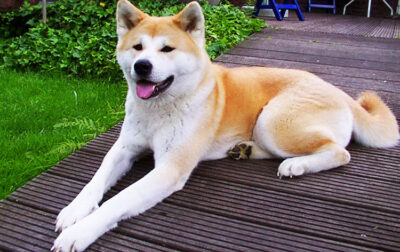The Akita is a large and powerful breed of dog originating from Japan. Known for its loyalty, courage, and protectiveness, the Akita is a popular breed for those looking for a strong and dependable companion. In this article, we will explore the Akita temperament in-depth and discuss what makes this breed such a unique and beloved companion.
The Akita is a loyal and affectionate breed to their family. They form strong bonds with their owners and are known to protect their loved ones. This breed is known for its courage and will not hesitate to defend its family if they feel threatened.
Moreover, Akitas are independent dogs and can be pretty aloof toward strangers. They are not typically friendly towards unfamiliar people, but with proper socialization, they can learn to be more accepting of new people.
Akitas have a dominant temperament and can be territorial toward other dogs. They are not typically aggressive but have a strong instinct to protect their territory and may display dominant behavior toward other dogs. This breed is also known for being strong-willed and stubborn sometimes.
Training and early socialization are essential to help the Akita learn proper behavior and become well-adjusted dogs.
Akita temperament
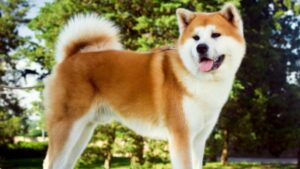
The Akita is a large and powerful breed known for its loyalty and affection towards its family. This breed is incredibly devoted to its owners and will form strong bonds with those it loves. Akitas are protective dogs by nature and will not hesitate to defend their family if they feel threatened. They are courageous and confident, which makes them excellent watchdogs.
One of the most distinctive traits of the Akita temperament is their independence. They are not as clingy or needy as some other breeds and are content to spend time alone when necessary. Akitas are also not known for being overly friendly towards strangers and can be quite aloof with people they don’t know.
This is why early socialization is so important for the breed, as it can help them learn to be more accepting of new people and situations.
Akitas have a dominant temperament and can be territorial toward other dogs. They are not typically aggressive but have a strong instinct to protect their territory and may display dominant behavior toward other dogs. This can make them difficult to introduce to other dogs and may require careful supervision during interactions with other canines.
The Akita can also be quite stubborn and strong-willed, making training challenging for inexperienced dog owners. This breed requires a confident and assertive leader who can provide structure and consistency in training. Positive reinforcement techniques, such as treats and praise, can help motivate Akita to learn and follow commands.
Are Akitas good family dogs?
Akitas can make good family dogs with proper training and socialization. They are loyal and affectionate to their family and can form strong bonds with children. However, they have a dominant and territorial temperament and can be aloof towards strangers, making them better suited for families with older children.
Additionally, they have a strong prey drive and may not be safe with smaller household pets, such as cats or small dogs. It’s essential to carefully consider Akita’s traits and needs before bringing one into your home. Professional training and guidance can also be beneficial in helping Akita become a well-behaved and well-adjusted member of the family.
Are Akitas aggressive?
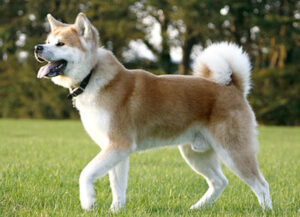
Akitas can exhibit aggressive behavior if they are not adequately trained and socialized. However, it’s important to note that aggression is not a common trait in the breed and is typically a result of poor training, lack of socialization, or abusive treatment.
Moreover, Akitas can be protective of their family and may display dominant behavior towards other dogs, but this does not necessarily make them aggressive. With proper training and socialization, Akitas can learn to control their instincts and become well-behaved, non-aggressive pets.
However, it is essential to remember that every dog is unique and may have its personality and temperament. It’s important to understand that dog aggression can have many causes, including fear, anxiety, frustration, and territorial behavior.
In Akitas, aggression can also be linked to their protective nature and instinct to defend their family and territory. This breed can also be dominant toward other dogs, sometimes leading to aggressive behavior.
Furthermore, proper training and socialization can help prevent and manage aggressive behavior in Akitas. This involves teaching the appropriate dog behaviors and socializing them with various people, animals, and environments.
Socialization should start early and continue throughout the dog’s life to ensure that it remains well-adjusted and friendly. Training should also involve positive reinforcement techniques and focus on building a solid bond between the dog and its owner.
It’s also important to understand that some dogs may have genetic or behavioral predispositions to aggression. If your Akita is displaying aggressive behavior, it’s vital to seek professional help from a veterinarian or a dog behaviorist. These professionals can help determine the underlying cause of the aggression and develop a plan for managing and reducing the behavior.
Are Akitas good with children?
Akitas can be good with children if they are properly socialized and trained. They are known for their loyalty and affection toward their family and can form strong bonds with children. However, because of their size and strength, it’s important to supervise them around young children to ensure that both the dog and the child are safe.
In addition, Akitas can be protective of their family, and they may display dominant behavior towards other dogs. This can make them better suited for families with older children who can understand the breed’s behavior and limitations.
It’s also important to note that children should be taught how to treat dogs with respect and kindness and never be allowed to roughhouse or play aggressively with the dog.
Early socialization ensures that an Akita grows into a well-behaved and well-adjusted pet. This should involve exposing the dog to various people, animals, and environments and teaching it appropriate behaviors. Professional training and guidance can also be beneficial in helping Akita become a good family pet.
Are Akitas good with other pets?
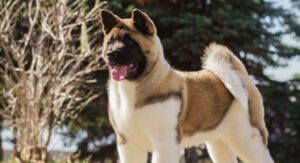
Akitas can have a high prey drive and may not be good with other household pets, such as cats or small dogs. They were originally bred as hunting dogs and had a strong instinct to chase and capture small animals. This instinct can sometimes lead to aggressive behavior towards other pets, especially if the Akita is not properly socialized and trained.
However, early socialization and training can help prevent and manage any aggressive behavior toward other pets. This involves exposing the Akita to various animals and environments and teaching it appropriate behaviors. Professional training and guidance can also be beneficial in helping the Akita become a well-behaved and well-adjusted pet.
If you have other pets in your home, it’s essential to carefully consider Akita’s traits and needs before bringing one into your home. You may also need to supervise the Akita and your other pets to ensure everyone is safe and getting along well.
Do Akitas require a lot of exercises?
Akitas are a high-energy breed and require significant exercise to maintain their physical and mental well-being. This can include daily walks, jogs, runs, playtime, and interactive games. Akitas also enjoy participating in dog sports, such as agility and obedience, which can provide physical and mental stimulation.
However, Akitas were initially bred as hunting dogs and had a strong instinct to chase and capture prey. As a result, they have a high energy level and a need for physical activity. Without sufficient exercise, Akitas may become destructive or develop behavioral problems.
In addition to physical exercise, Akitas also benefit from mental stimulation. This can include training and obedience exercises, interactive games, and puzzles. Mental stimulation can help prevent boredom, reduce anxiety and stress, and maintain Akita’s overall well-being.
Are Akitas easy to train?
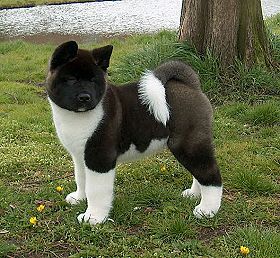
Akitas can be independent and strong-willed, sometimes making it difficult to train. However, they can be taught to be well-behaved and obedient with the right approach and training methods.
Akitas respond well to positive reinforcement training methods, such as praise, treats, and play. They do not respond well to harsh training methods, such as physical punishment or scolding, which can lead to fear, aggression, or other behavioral problems.
Early socialization and training are important for Akitas, as they can help prevent dominance-related behavior and establish good behavior patterns. Training should begin as soon as possible and focus on basic obedience, such as sit, stay, come, and heel. Advanced training, such as obedience trials, agility, and therapy dog training, can also benefit Akita.
Consistency and patience are key when training an Akita. Training sessions should be short and positive, and it’s important to praise the dog for its successes and to reward it for its efforts.
Are Akitas loyal dogs?
Akitas can be independent and strong-willed, sometimes making it difficult to train. However, they can be taught to be well-behaved and obedient with the right approach and training methods.
Akitas respond well to positive reinforcement training methods, such as praise, treats, and play. They do not respond well to harsh training methods, such as physical punishment or scolding, which can lead to fear, aggression, or other behavioral problems.
Early socialization and training are essential for Akitas, as they can help prevent dominance-related behavior and establish good behavior patterns. Training should begin as soon as possible and focus on basic obedience, such as sit, stay, come, and heel. Advanced training, such as obedience trials, agility, and therapy dog training, can also benefit Akita.
Consistency and patience are key when training an Akita. Training sessions should be short and positive, and it’s important to praise the dog for its successes and to reward it for its efforts.
Are Akitas good watchdogs?
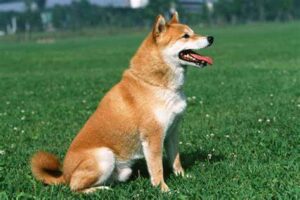
Akitas were initially bred as hunting dogs and were used to guard Japanese royalty, so they had the instinct to protect their owners and territory. This instinct makes them good watchdogs.
In addition, Akitas have a strong, deep bark that can alert their owners to potential threats. They also have a powerful presence and can appear intimidating, which can deter intruders.
However, Akitas can also be friendly and trusting and may not bark at unfamiliar people or animals. It’s important to properly socialize and train the Akita to recognize what constitutes a threat and to respond appropriately.
So, Akitas are good watchdogs due to their instinct to protect their owners and territory. Their robust and deep bark and powerful presence can deter intruders. Proper socialization and training can help Akita become an effective watchdog and ensure that it responds appropriately to potential threats.
Are Akitas good for first-time owners?
Akitas can be challenging for first-time dog owners due to their high energy level, independence, and strong will. Akitas require significant exercise, mental stimulation, and training, and they may not be suitable for those who cannot provide these needs.
First-time owners should also be prepared for the cost and time required to properly care for an Akita, including regular grooming, veterinary check-ups, and training.
Akitas may not be the best choice for first-time owners looking for a low-maintenance or passive dog. They require a strong leader, consistent training, and discipline to prevent behavioral problems.
Do Akitas shed a lot?
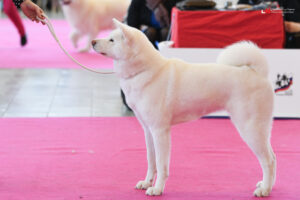
Akitas are heavy shedders, particularly during the spring and fall when they shed their undercoats. The amount of shedding can vary depending on the individual dog, but it is generally consistent and can be significant.
Moreover, Akitas have a thick, dense double coat that protects them from the cold in the winter and keeps them cool in the summer. The undercoat is soft and dense, while the outer coat is stiff and straight.
Regular grooming can help minimize shedding and keep the coat healthy and shiny. Brushing the Akita at least once a week can remove loose fur and prevent matting, and regular bathing can keep the skin and coat clean.
Are Akitas good apartment dogs?
Akitas may not be the best choice for apartment living due to its high energy level and exercise requirements. They are a large breed and require plenty of space to move and play. They also have a strong instinct to protect their territory, which can lead to barking and other disruptive behaviors in close quarters.
Moreover, Akitas need plenty of exercises, including daily walks and playtime, to maintain their physical and mental well-being. They also need plenty of space to roam and explore, which is challenging to provide in a small apartment.
Akitas may not be the best choice for apartment living due to its high energy level, exercise requirements, and need for space. They are a large breed that requires plenty of room to move and play, and their solid territorial instincts may lead to disruptive behaviors in close quarters. They may be better suited to a home with a large yard or a family with a lifestyle with plenty of outdoor activities.
Are Akitas prone to certain health issues?
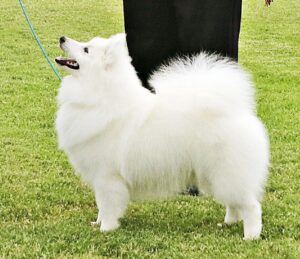
Akitas are predisposed to certain health issues, including:
- Hip dysplasia: A genetic condition where the hip joint does not develop properly, causing arthritis and other problems.
- Bloat: A potentially life-threatening condition in which the stomach expands and twists, cutting off the blood supply.
- Eye problems: Akitas are prone to eye problems, such as cataracts, progressive retinal atrophy, and cherry eye.
- Skin allergies: Akitas can be prone to skin allergies, which can cause itching, scratching, and skin infections.
- Autoimmune diseases: Akitas can be prone to autoimmune diseases, such as autoimmune hemolytic anemia and systemic lupus erythematosus.
Are Akitas good guard dogs?
Akitas can be good guard dogs due to their natural protective instincts and loyalty to their owners. They are naturally suspicious of strangers and can be wary of unfamiliar people and animals.
In addition, Akitas are territorial and can protect their home and family. They have a strong presence and can be intimidating to potential intruders, making them effective deterrents.
However, it is important to properly socialize and train Akitas to prevent aggressive or territorial behavior towards people or other animals. Training should focus on obedience, proper socialization, and positive reinforcement techniques.
How much grooming do Akitas need?
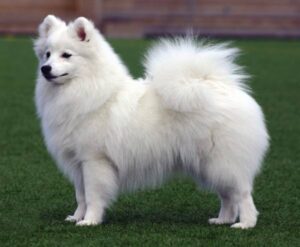
Akitas have a thick, dense double coat that requires regular grooming to maintain their health and appearance. The amount of grooming needed can vary depending on the dog, but it is generally consistent and can be significant.
At a minimum, Akitas should be brushed once a week to remove loose fur and prevent matting. Shedding season, which occurs twice a year, may require more frequent brushing to control the amount of hair shed.
Bathing is also vital for Akitas, especially during shedding season when loose fur can clog the skin and cause itching and infections. Bathing should be done using a mild shampoo specifically designed for dogs, and you should rinse the coat thoroughly to remove all soap residue.
In addition to brushing and bathing, Akitas may also require occasional trimming or clipping, especially around the ears, paws, and underbelly. This will help keep the coat looking neat and tidy, and it will also help prevent matting and tangling.
Conclusion
The exposition on Akita temperament is concluded on the note that Akitas are a highly valued breed known for their loyalty, affection, playfulness, and protective nature. They are intelligent dogs that respond well to consistent and firm training, but it is crucial to start early and adequately socialize them.
As a large and robust breed, Akitas require regular exercise and mental stimulation to maintain their physical and emotional well-being. Akitas can make excellent companions and loyal family members with proper care, training, and socialization.
However, it’s essential to be aware of their dominant and potentially aggressive behavior toward other dogs and to be responsible owners to ensure they are safe and live a happy life.

